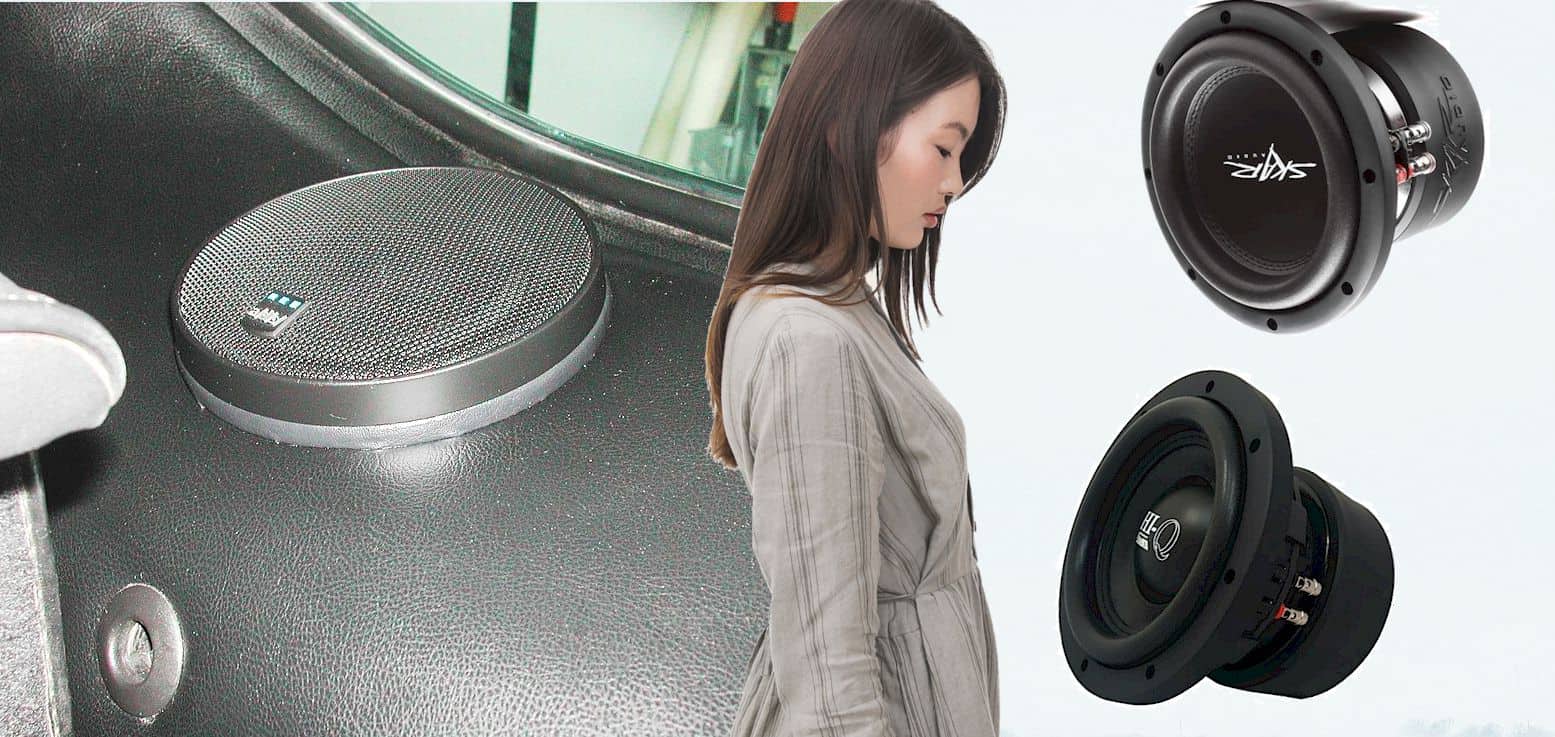Finding the perfect speaker for your car is more technical than finding a speaker for your desk. You have to go through the tough decision of getting 2 ohm vs 4 ohm speakers You can’t decide without knowing anything, right?
Don’t worry, now. Here, I will tell you all you need to know about the impedance of speakers and how they perform. By the end of it, choosing the right speaker will surely be one of your expertise. So, let’s get going with it right away.
Contents
Speaker’s Impedance
Before you know about the right impedance, let’s get a bit into what it is and how it works. The impedance of the speaker determines the resistance of a speaker concerning an amplifier.
In simple terms, speaker impedance is the number that dictates how much pressure your speaker will put on the amplifier. The correlation of impedance and amplifier power is negative. That means a lower impedance will draw out a higher power from the amplifier.
Simply put, a lower impedance means a lower resistance in the current. This means more current will flow through the speakers. To produce more current, the amplifier has to use more power. And that’s how the speaker impedance matters.
For car speakers, you can't get higher than a 4-ohm impedance. That’s mostly because of the 12v power source your car uses. Another typical choice for car speakers is 2-ohm speakers. So, how does this impact the amp?
To help you understand better, I have this example. This will clear all the concepts of 2ohm and 4-ohm speakers.
So, when your car has a 4-ohm speaker with 100W of power, it will draw the same amount from the amplifier. This means even with a 100w amplifier; you can use 4-ohm speakers with ease.
On the other hand, a 2-ohm speaker of the same 100w power will need 200w from your amplifier. As a result, you can't use your usual 100w amplifier with a 2-ohm speaker. It won’t let either work, or it may ruin the amplifier completely.
This is the impact of these speakers on the amplifier. Now, there are several other differences between these two speaker impedances. Let’s take a look at that quickly.
Related: The best location to mount your amp in your car
The Difference Between 2 ohm and 4-ohm Car Speakers
There are quite a lot of differences you will find between 2ohm and 4ohm speakers. I will take you through them one by one.
Resistance
The major difference that makes them completely different is the resistance value. You can already understand that the 2-Ohm speaker comes with a resistance of 2. At the same time, the 4-ohm speaker has a resistance of 4.
What this means is a 2-ohm speaker has less resistance. Thus it will allow more current to flow through. In contrast, the 4-ohm speaker has a higher resistance. Thus it allows less current to flow through.
This amount impacts a lot of things. It affects the sound quality, power consumption, amplifier requirements, and so forth.
Sound quality
While many people may not know this, there is a significant difference in the sound quality of these speakers. Keep in mind that I am considering the same amp for both these types of speakers.
A 2-ohm speaker allows more current to pass through. Here, more current usually means more power. With that extra power level, 2-ohm speakers can produce a louder sound. So, this means you get louder sounds from a 2-ohm speaker.
On the other hand, 4-ohm speakers don’t take as much power from the amplifier. This leads to lower power which means the sound won't be as loud as the 2-ohm speakers. However, with more control in power, you get a distinct increase in the sound quality. This is because you use the same amplifier for both of them.
You can still get a better sound quality from the 2-ohm speakers, but you have to go through many settings and may need a better amp that allows you to do so.
Amp compatibility
4-ohm speakers don’t need too much power as they have a higher resistance. The higher resistance restricts the flow of electricity, which eventually reduces the amount of power your speaker needs.
With a 4-ohm speaker, you have less to worry about your car amplifier. You can be pretty sure that it won’t damage or harm the amplifier in any way. So, if you have no idea about amplifier capabilities 4-ohm speaker is a safer option.
On the other hand, you have to make sure that your amplifier can handle 2-ohm power requirements. Let’s say, if the 4-ohm requires 100w of power, then the 2-ohm will require 200w. And if you have a 100w amplifier, it will take too much load from the 2-ohm.
This will cause overheating issues and may even damage the amplifier. So, you have to know how much your amplifier can take in choosing a 2-ohm speaker.
In short, 4-ohm speakers are compatible with almost all kinds of car amplifiers. Whereas 2-ohm have their special power requirements.
Cost
There is a significant difference between a 2-ohm speaker and a 4-ohm speaker regarding pricing and cost.
First of all, 2-ohm speakers have a higher price than 4-ohm speakers. That’s because they have a louder sound to produce, which is what many people want to have in their car speakers. Also, 2-ohm speakers come with greater fine-tuning options compared to the 4-ohm speakers.
Also, to run a 2-ohm speaker in your car, you will need a powerful amplifier. If your car already has a powerful amplifier, then you are in luck. But if not, then you have to buy one that may add a bit of cost.
So, all in all, using 2-ohm speakers come with a greater cost than using 4-ohm speakers. It will come down to whether you want to have that boost in volume or not.
Durability
There is no clear winner here. It mostly depends on the speakers you are using. Theoretically, 4ohms should last longer than 2ohm speakers. Why?
Well, 4-ohm speakers have a higher resistance which stops too much current from flowing through. This leads to a more controlled and precise current flow, rather than overpowering stuff with electricity. Because of this, 4-ohm speakers supposedly last longer than 2-ohm speakers.
Related: Pioneer Vs. Kenwood Speakers
Can you use 4-ohm speakers with a 2-ohm amp?
Before this article, this question would have been a nightmare to answer. But now, it won’t be that difficult to answer, will it? You already know the answer, but still, let's get through this.
The answer is, of course, you can use a 4-ohm speaker with a 2-ohm amp because a 2-ohm amp will have more than enough power to provide to a 4-ohm speaker. To put things simply, if the amp is capable of handling 2-ohm speakers, then it can easily handle a 4-ohm speaker.
Now, things take a turn when you think of it in the opposite direction. Everything starts to go downhill when you try to power up a 2-ohm speaker with a 4-ohm amp. If you want that to work, you will need 2-ohm speakers requiring half the power as a 4ohm speaker.
For example, if you have two 120W 4-ohm amplifiers and want to use 2-ohm speakers, you have to get two 60w 2ohm speakers. With lower power, the sound quality will also go down. In the end, it won't be worth going for 2-ohm speakers at all.
FAQ
Here are some common questions regarding 2ohm and 4ohm speakers-
- Which subwoofer is better for a car, 2ohm or 4ohm?
If you want loud bass and louder sounds, then a 2ohm subwoofer with a powerful amplifier should be your target. But if you are tight on budget and want more clarity, then a 4ohm subwoofer is a better choice.
- How much does the impedance affect the sound quality?
In truth, if you are an audio expert, you might notice the change in sound quality. Otherwise, there isn’t much difference between the sound quality of 2-ohm speakers and 4-ohm speakers. Only the 2-ohm produces a louder sound, whereas the 4-ohm has a clearer sound quality.
- Can you upgrade from 4ohms to 2ohms without changing the amplifier?
That depends on the amplifier you currently have. If it’s an amplifier for 4-ohm, you can’t upgrade to 2ohm speakers without changing the amplifier. But if it’s a 2ohm amp, then you can go for 2-ohm speakers.
Final words
To sum up, in the battle of 2 ohm vs 4 ohm speakers, there is no clear winner. Even though in many cases, 4-ohm seems to be more of a reasonable choice. However, you can’t ignore the loud sound quality factor of a 2-ohm speaker either.
So, it all boils down to your needs. If you are looking for some boost in the volume and bass in your car music, then 2-ohm is the way to go, even though it costs more.
But if you want to keep everything reasonable and the volume or bass doesn’t matter too much, Ato you, then 4-ohms should be your pick.

HI, John Andrew here. I’ve been an audiophile since I was a little kid. I’m an original member of myaudiolover . It emerged as a way for me to share my passion and knowledge for audio technology. If you’re looking for tips, techniques, and insights about audio-tech, that can enable your productions that professional edge, then MyAudioLover is the place for you!

